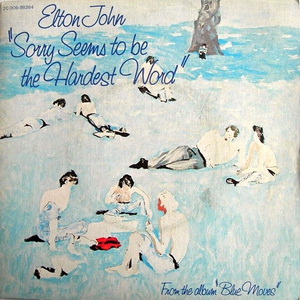
Sorry Seems to Be the Hardest Word
"Sorry Seems to Be the Hardest Word" is a song written by English musician Elton John and songwriter Bernie Taupin. It was recorded by Elton John and released in 1976, both as a single and as part of the Blue Moves album. It was John's second single released by The Rocket Record Company. The song is a mournful ballad about a romantic relationship which is falling apart.
"Sorry Seems to Be the Hardest Word"
The song also appeared the following year on Greatest Hits Volume II, though for copyright reasons it no longer appears on the current version of that album. It now appears on Greatest Hits 1976–1986, The Very Best of Elton John, Greatest Hits 1970–2002 and Diamonds as well as a number of other compilations.
Background and composition[edit]
"Sorry Seems to Be the Hardest Word" is a mournful ballad about a romantic relationship that is falling apart. Bernie Taupin said: "It's a pretty simple idea, but one that I think everyone can relate to at one point or another in their life. That whole idealistic feeling people get when they want to save something from dying when they basically know deep down inside that it's already dead. It's that heartbreaking, sickening part of love that you wouldn't wish on anyone if you didn't know that it's inevitable that they're going to experience it one day."[1]
Elton John began writing the song in 1975 in Los Angeles. Whilst many of his songs involved Taupin writing lyrics first, then John writing the music later, John wrote the melody and most of the lyrics for "Sorry Seems to Be the Hardest Word", and Taupin completed it afterwards. John explained: "I was sitting there and out it came, 'What have I got to do to make you love me.'"
Taupin later said: "I don't think he was intending on writing a song, but we were sitting around an apartment in Los Angeles, and he was playing around on the piano and he came up with this melody line, and I said, 'Hey, that's really nice.' For some reason this lyrical line, 'Sorry seems to be the hardest word' ran through my head, and it fit perfectly with what he was playing. So I said, 'Don't do anything more to that, let me go write something,' so I wrote it out in a few minutes and we had the song." Taupin added: "[The i]nteresting thing about 'Sorry Seems to Be the Hardest Word' is that it's one of the rare occasions when Elton played me a melody line that inspired a lyric, as opposed to our routine of the lyrics always coming first. He was messing around on the piano one day and was playing something and asked me what did I think. It was actually pretty immediate, the title and the first couple of lines came into my head in a way that I guess I felt they were already there and just needed a little prompting."[1]
Reception[edit]
Billboard praised John's vocal performance, calling it "almost painfully sincere and believable" and also commented on the complexity of the backing vocals.[2] Cash Box called it "a tender love song about breaking up."[3] Record World called it "Elton's most emotional and moving ballad performance since 'Someone Saved My Life Tonight.'"[4]
"Sorry Seems to Be the Hardest Word"
"Sweet Thing"
9 December 2002
- 3:41 (album version)
- 3:31 (radio edit)
Other versions[edit]
In 2004, Elton John and Ray Charles performed the song on Charles' duet album, Genius Loves Company. It would turn out to be the last recording Charles made before his death that June.[80] The duet was nominated for a Grammy Award for Best Pop Collaboration with Vocals.
In 2004, Kenny G covered the song in duet with Richard Marx on his album At Last...The Duets Album.